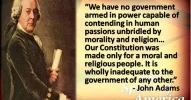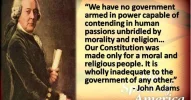Just wanted to wish everyone in the HOP a Happy Thanksgiving. Don't anyone eat too much turkey.
As we think of Thanksgiving we think of Pilgrims & Puritans and we think about the often talked about wish for religious freedom. While true that does not most accurately describe the situation. They actually wanted to go somewhere where they could kind do the same thing they were fleeing from in England... establish their own government backed religion.
This of course became quite an issue as one might expect because many other large groups came here wanting to follow their religion and certainly didn't want a specific government backed religion (unless it was there's I suppose). Hence the reason the Founding Fathers many of which were Deists separated church and government.
Hence the reason the Founding Fathers many of which were Deists separated church and government.
Here are a couple good overviews I found...
THE PILGRIMS
Pilgrims were members of English separatist congregations who fled what they regarded as religious persecution and settled in North America in 1620. English separatists were Protestants who believed that the Anglican church still contained too much which was still Roman Catholic in nature. They wanted to reform the church to make it better, but no longer believed that to be possible and so "separated" from it, creating their own congregations where they could believe and worship as they felt proper.
The Pilgrims eventually tried to emigrate to Holland which, after some difficulties, they managed to do. They tried to make a life there, but feared further hostilities between Holland and Spain and were not at all happy with the morals of the Dutch, and on September 6, 1620, the left England for North America on the ship Mayflower.
The arrived off of Cap Cod on November 21 and settlted near Plymouth three weeks later. The first winter was harsh, with almost half their members dying, but they received aid from Native Americans which allowed them to more easily survive. Their colony never grew very large and was eventually absorbed by the larger Massachusetts Bay Colony, but the symbolism of the Pilgrims fleeing persecution has remained strong in American history and mythology.
What is interesting about this, however, is the fact that they were not seeking religious freedom as it is ideally considered in modern America. They were, instead, seeking to establish their own church which would be supported and enforced by their own state. They were, in essence, trying to do unto others what they did not want done unto themselves. This desire for "religious freedom" which ultimately meant the freedom to impose one's own religion on others has been a common theme in American history.
EUROPEAN PERSECUTION
The religious persecution that drove settlers from Europe to the British North American colonies sprang from the conviction, held by Protestants and Catholics alike, that uniformity of religion must exist in any given society. This conviction rested on the belief that there was one true religion and that it was the duty of the civil authorities to impose it, forcibly if necessary, in the interest of saving the souls of all citizens. Nonconformists could expect no mercy and might be executed as heretics. The dominance of the concept, denounced by Roger Williams as "inforced uniformity of religion," meant majority religious groups who controlled political power punished dissenters in their midst. In some areas Catholics persecuted Protestants, in others Protestants persecuted Catholics, and in still others Catholics and Protestants persecuted wayward coreligionists. Although England renounced religious persecution in 1689, it persisted on the European continent. Religious persecution, as observers in every century have commented, is often bloody and implacable and is remembered and resented for generations.
When we see the damage caused... all the way to burning people at the stake for being "witches"... it's clear everyone should be allowed freedom to pratice any religion... but the government should never give it any authority under the law. Wise men those Founding Fathers!
As we think of Thanksgiving we think of Pilgrims & Puritans and we think about the often talked about wish for religious freedom. While true that does not most accurately describe the situation. They actually wanted to go somewhere where they could kind do the same thing they were fleeing from in England... establish their own government backed religion.
This of course became quite an issue as one might expect because many other large groups came here wanting to follow their religion and certainly didn't want a specific government backed religion (unless it was there's I suppose).
Here are a couple good overviews I found...
THE PILGRIMS
Pilgrims were members of English separatist congregations who fled what they regarded as religious persecution and settled in North America in 1620. English separatists were Protestants who believed that the Anglican church still contained too much which was still Roman Catholic in nature. They wanted to reform the church to make it better, but no longer believed that to be possible and so "separated" from it, creating their own congregations where they could believe and worship as they felt proper.
The Pilgrims eventually tried to emigrate to Holland which, after some difficulties, they managed to do. They tried to make a life there, but feared further hostilities between Holland and Spain and were not at all happy with the morals of the Dutch, and on September 6, 1620, the left England for North America on the ship Mayflower.
The arrived off of Cap Cod on November 21 and settlted near Plymouth three weeks later. The first winter was harsh, with almost half their members dying, but they received aid from Native Americans which allowed them to more easily survive. Their colony never grew very large and was eventually absorbed by the larger Massachusetts Bay Colony, but the symbolism of the Pilgrims fleeing persecution has remained strong in American history and mythology.
What is interesting about this, however, is the fact that they were not seeking religious freedom as it is ideally considered in modern America. They were, instead, seeking to establish their own church which would be supported and enforced by their own state. They were, in essence, trying to do unto others what they did not want done unto themselves. This desire for "religious freedom" which ultimately meant the freedom to impose one's own religion on others has been a common theme in American history.
EUROPEAN PERSECUTION
The religious persecution that drove settlers from Europe to the British North American colonies sprang from the conviction, held by Protestants and Catholics alike, that uniformity of religion must exist in any given society. This conviction rested on the belief that there was one true religion and that it was the duty of the civil authorities to impose it, forcibly if necessary, in the interest of saving the souls of all citizens. Nonconformists could expect no mercy and might be executed as heretics. The dominance of the concept, denounced by Roger Williams as "inforced uniformity of religion," meant majority religious groups who controlled political power punished dissenters in their midst. In some areas Catholics persecuted Protestants, in others Protestants persecuted Catholics, and in still others Catholics and Protestants persecuted wayward coreligionists. Although England renounced religious persecution in 1689, it persisted on the European continent. Religious persecution, as observers in every century have commented, is often bloody and implacable and is remembered and resented for generations.
When we see the damage caused... all the way to burning people at the stake for being "witches"... it's clear everyone should be allowed freedom to pratice any religion... but the government should never give it any authority under the law. Wise men those Founding Fathers!


